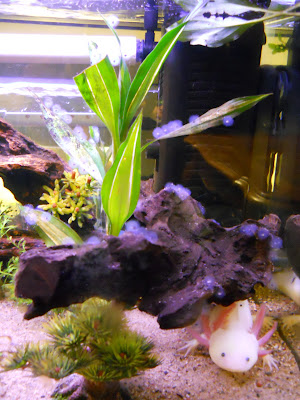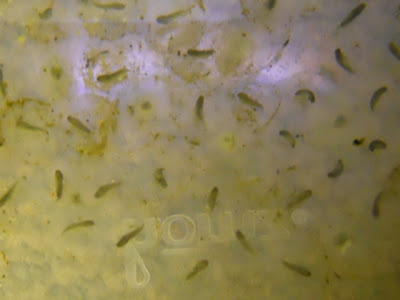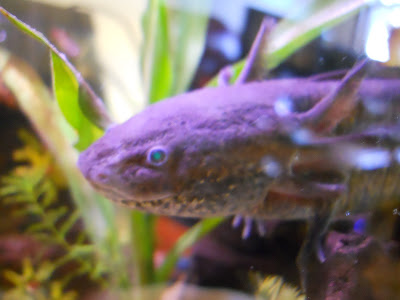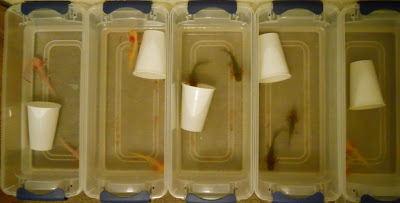We started this summer with 63 babies, and today I sold the last few to the Malawi Aquatics pet store near Saint Louis. All that is left is Viceroy Bubbles Von Salamancer (the one we are going to keep) and two we are saving for a friend.
It has been an adventure, and we are more than willing to answer any questions anyone might have. Let us know if you have any problems, and let us know if they are doing well at isuaxolotl@gmail.com. :)
Good luck, and happy axolotl ranching! >(^‿^)<
ISU Axolotls
An axolotl is a fully aquatic newt (it spends its whole life underwater). They are fun to watch and pretty easy to take care of. I have both wild type (black) and leucistic (white) axolotls available. They are GFP (meaning they glow green under a black light). For more information about axolotls, check out these useful resources: axolotl.org caudata.org If you have any questions or want to come see them, let me know! Just send me a message at isuaxolotl@gmail.com.
Monday, July 30, 2012
Sunday, July 22, 2012
Glowing Under the Black Light
The camera doesn't do it justice. They look a lot cooler in person.
The wild-types don't glow as much as the leucistics, but their eyes look pretty awesome.
It doesn't show very well, but this wild-type's head and tail are glowing.
The next two pictures were taken from my roommate's phone about a month ago.
 |
| This is Kipper, the mom. She is also a leucistic. |
Monday, July 2, 2012
No Longer Babies -- Juveniles
The technical name for a "baby" axolotl is a larva or larvae, but I think that makes them sound like a bug. Gross. Anyways, we are pretty sure they are officially juveniles now.
And they are always hungry.
I moved them into larger containers. Coincidentally, the exact same containers they were in as little hatchlings nearly two months ago.
They are getting along just fine, and they love to play.
The leucistic on the bottom is Viceroy Bubbles von Salamancer. Bubbles is our only leucistic which has spots.
As always, if you are interested or would like more information send an email to isuaxolotl@gmail.com.
Wednesday, June 27, 2012
Baby Axolotl Updates
Our axolotl hatchlings are about 4 inches long now and growing! When they are this age, it is typical for them to grow an inch a month.
This is the harlequin we named Bubbles next to Kipper (the mom).
Leucistic GFP Wild-type GFP
Leucistic not GFP Wild-type GFP
They look awesome under the black light. I will hopefully post some more pictures soon!
We only have 10 hatchlings left!
Leucistic GFP: 4
Leucistic not GFP: 1
Wild-type GPF: 5
Wild-type not GFP: 0
If you are still considering whether you want one or not, act fast because we won't have them for long!
I will update this post with more pictures as they continue to grow. If you are interested in owning one or more of these awesome adorable creatures, please contact Jack atisuaxolotl@gmail.com.
Friday, April 13, 2012
Baby Axolotls
As our axolotls reached adolescence, we were able to determine that Wooper is a male and Kipper is a female, so we should have seen this coming. One night as we were studying, we noticed that Kipper was acting really weird and stressed. That's when we realized that Kipper was laying eggs... everywhere. We were not prepared.
 |
| Mama Kipper |
Thankfully, we discovered that the eggs usually take about two weeks to hatch, so we had some time to do some research. Most of the information used to learn how to take care of baby axolotls cam from axolotl.org and caudata.org. Axolotls will try to eat anything that moves, so we decided to separate the babies from their parents.
 |
| Day 4 after eggs were laid |
 |
| Day 7 after eggs were laid |
 |
| Hatching Day: Day 11 after eggs were laid |
Ours hatched a little faster than two weeks. We had about 80 successfully hatch.
At first they were all the same color, but after about a week you can start to see the color pigments fading from the lighter axolotls.
 |
| 3 Days Old |
 |
| 6 Days Old |
 |
| 10 Days Old |
About 2 weeks old during feeding time. I apologize
that I couldn't get it in focus.
 |
| 2 weeks old |
 |
| They are getting bigger! We had to move some to a larger container. |
 |
| April 20: Some of the babies are large enough to eat bloodworms. |
 |
| April 22: You can tell how much they have grown by comparing them to the crevice in the container. |
 |
| April 24: They are growing little arms and fingers. |
 |
| April 24: Another angle of the arms. |
 | ||
| April 26: We noticed that they were looking kind of crowded, so we have dispersed the larger ones to a new container. |
April 29: Feeding time.
 |
| It is difficult to tell them apart, except this one... It is the only leucistic which has spots! |
Today is the day that we separated the parents, so we don't have this situation again in the near future. We coaxed Wooper into a container for transfer, and I was amazed at how large he has gotten! He is not even one year old yet, and he is about 10 inches. Here are the images for comparison, the containers are the same size.
 |
| April 30: The little ones needed to be spread out more. The orange in the bottom-right container is baby brine shrimp. |
 |
| May 2 (32 days): Many of the babies have back legs now. |
 |
| May 2 (32 days): They have started to come to the surface when we get close. They know that humans bring food. |
 |
| May 2 (32 days): Ohai! You haz wirms for me? |
Sorry for the lack of updates! Both Brittany and I moved. I am still in Ames, though. She put me (Jack) in charge of the blog now. I'm almost done settling in, and so are the hatchlings!
May 9 (39 days): We have been having some biting problems recently. A couple of our hatchlings have lost limbs. :( It's too bad they don't have regeneration superpowers... oh wait, they do... This little fella had his right hand nipped off a few days ago (once again, sad face), but you can see the fingers are growing back already! I don't know about you, but I'm amazed by this. In the meantime, I will need to find a solution to this biting problem.
May 10 (40 days): PROBLEM SOLVED!
May 10 (40 days): Here is a close up of one of our wild types.
PARTY-LOTLS!
Sorry, that was a bit obnoxious...
May 19 (49 days): Yup, it turns out quite a few of the hatchlings inherited the GFP trait from their parents. Behold the glowy axolotls! This is a leucistic under a black light. The wild types are still glowy, but not nearly as glowy as the leucistics. Sorry for the poor quality, my camera did not like the black light. Out of the 32 hatchlings I have, 21 of them are GFP. If you want one of these, please let me know.
Don't worry, the axolotls aren't out of focus in real life.
The only good picture that turned out it a creepy picture of Wooper! Those glowy eyes...
>(o_o)<
I don't have any pictures of Kipper because she is with Brittany. Brittany said she wanted to get a black light too, so maybe we will see some pictures of her glowy hatchlings and glowy Kipper too!
I will update this post with more pictures as they continue to grow. If you are interested in owning one or more of these awesome adorable creatures, please contact Jack at isuaxolotl@gmail.com.
Kipper and Wooper
In September 2011, we bought Kipper and Wooper from a breeder in St. Louis. Kipper was named after the Mudkip Pokemon and Wooper was named after the Wooper Pokemon.
They are all grown up now, and they are awesome pets. The axolotls start to associate humans with food, so when you are in the room they respond to you.
They eat earthworms and enjoy digging in the sand. Here is a video of Kipper swimming around the tank.
 |
| Kipper |
 |
| Wooper |
 |
| Kipper |
 |
| Wooper |
Subscribe to:
Comments (Atom)





























